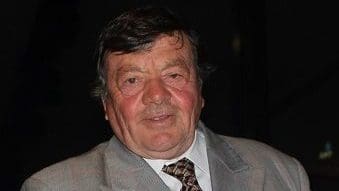
Former AWI chairman Wal Merriman
NEW South Wales Merino breeder Wal Merriman has refused to confirm or deny if he is joining the Australian Superfine Wool Growers Association to oppose moves for members to support non-mulesing.
Sheep Central has been told the former Australian Wool Innovation chairman and Merryville Merino Stud owner has applied to join the ASWGA, reportedly to counter a move for association members to adopt a non-mulesing policy.
When contacted this weekend, Mr Merriman would not confirm or deny why he is seeking to become a member of the association.
“What I do is my business,” Mr Merriman said, before hanging up the phone.
Mr Merriman has been a long-time defender of mulesing, including lobbying members of other wool organisations and running on a pro-mulesing ticket in the 2019 AWI election with current directors David Webster and Michelle Humphries.
“All three of us have a strong belief in the importance of maintaining the practice of mulesing for best practice animal welfare and industry viability until a suitable alternative is available,” a shareholder letter from the three election candidates said.
ASWGA president Mark Waters said during a recent trip to Italy, most of the Italian mills, that are also ASWGA members, were looking for the grower-members to stop mulesing. This message was reinforced by Paolo Zegna, director of the Italian luxury fashion house Ermenegildo Zegna Group, during the recent ASWGA farm tour and dinner event in Tasmania.
“He just said it would be good if you fellows would lead the industry into unmulesed – so that started the ball rolling.
“There is a little group up here (three growers) in the New England (area of New South Wales) who are quite positive that’s where we need to go.”
 Mr Waters said he had been invited to join the group. He has run a non-mulesed flock for eight years, but would not be drawn on his stance on the issue.
Mr Waters said he had been invited to join the group. He has run a non-mulesed flock for eight years, but would not be drawn on his stance on the issue.
“The vote is for the association, not for me – it’s a members’ vote, not my vote.”
He said an ASWGA commitment to a non-mulesed policy would involve a change of rules in the association’s constitution.
Mr Waters said he was about to do a regional trip through Victoria and Tasmania after visiting Goulburn and Mudgee members. The ASWGA annual general meeting will be held on 28 July in Melbourne.
“So we are just spelling out the facts; this is what’s going to happen if we stay, this is what’s going to happen if we move etcetera.
“I’m the meat in the sandwich, I’ve got blokes chewing at my ears from both sides.”
Mr Waters said an ASWGA commitment to non-mulesing has been talked about for some time. A ‘cease mulesing’ clause in the ASWGA animal welfare policy was proposed in 2017, but failed to get sufficient support.
Mr Waters said a lot of ASWGA members had stopped mulesing, but others had maintained the practice due to climatic conditions.
“Where we are now is we are still gathering information, we will get together, we’ve got our AGM in a couple of weeks.
“Then we’ll see if there is a big enough push to go.”
Mr Waters said 75 percent of financial members would need to support any change in the constitution for it to be successful.
“If the motion was put that we want to go to an unmulesed association and the vote got up, that’s what we would become.”
This would mean that growers who wanted to continue mulesing could not be ASWGA members, he said.
“But the motion’s got to get up.”
Mr Merriman’s application, along with other new applications, will have to go before a council meeting, at the annual general meeting.
Mr Waters said there might not be a vote on the issue at the AGM.
Earlier this month Farmonline reported that Former NSW ASWGA vice president and chairperson of the Goulburn Yass division Neil Carey had left the organisation because the body won’t take an anti-mulesing stance. Mr Carey could not be contacted.

Mulesing is the most effective way to control fly strike and prevent dark fibres in the wool. We intend to keep doing the practice and so don’t support any change to the (ASWGA) constitution. Leo Blanch
Many sheep breeders have run their businesses for twenty years without the cruel practice of mulesing. It needs to be banned.
I work as a shearer. I shear more than 20,000 sheep a year. I also own about 800 sheep. As such, I believe I have a unique position on the benefits and costs of mulesing.
Some breeds obviously don’t need mulesing — SAMM crossbreds. Some do benefit. There’s nothing like shearing large mobs of dirty flyblown tight unmulesed Merinos. In some years and on some places and with additional crutching you don’t need to mules. Some years I have shorn so-called mules-free fine Merinos and had to walk out. I just couldn’t handle the dead sheep and fly blown wool. Some farmers can do it and make it work. Some can not. Unless some wetter areas go from Merinos to crossbreds and some farmers move away from Merinos, non-mulesing is just going to push more shearers away from shearing and make shearing more expensive. I have certainly shorn non-mulesed Merinos that are run well and my own little mob of Merinos are not mulesed. But some farms just are not capable of running non-mulesed Merinos humanely and until that time, an across the board ruling is just a disaster waiting to happen.
Whatever else, it would seem that Wal Merriman has created another opportunity for wool growers to confront the unethical (and cruel) practice of mulesing.
This issue has been on wool growers’ agendae for decades, with firm deadlines being unheeded for the practice to be abolished, showing little concern for the survival of the industries’ wool market where retailers and the public are primed to reject wool from mulesed sheep.
The statement that a motion to abolish mulesing would be unconstitutional and illegal for the ASWGA is curious. I am not a member of that organisation, but unless the preservation of mulesing is embedded into its constitution as opposed to being the subject of previous motions, for most organisations members would not be precluded as a matter of procedure from reviewing the matter with a view to its reversal.
As currently constituted any grower who grows wool less than 19.5 microns and 70’s or better quality is eligible to be an Australian Superfine Wool Growers Association member. The constitution, which was written in the 1970’s, did not contemplate the issue of mulesing, so provided a grower meets the above requirements, pays their fees and is approved by the ASWGA council they can become a member.
In order for that to change and exclude growers who mules, 75 percent of the members must approve the change. It’s a significant change, so that’s fair enough. It’s interesting that Mr Merriman doesn’t appear to understand the damage he is doing to the industry that underpins his business.
Mr Merriman and his cohorts are pushing commercial growers to shedding sheep. I don’t understand their desire for destroying the wool industry. The customer is always right.